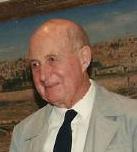Moshe Landau | |
|---|---|
 | |
| Supreme Court of Israel judge | |
| In office 1953–1982 | |
| President of the Supreme Court of Israel | |
| In office 1980–1982 | |
| Preceded by | Yoel Zussman |
| Succeeded by | Yitzhak Kahan |
| Personal details | |
| Born | 29 April 1912 Danzig, Kingdom of Prussia, Germany (present-day Gdańsk, Poland) |
| Died | 1 May 2011 (aged 99) Jerusalem, Israel |
Moshe Landau (Hebrew: משה לנדוי) (29 April 1912 – 1 May 2011)[1] was an Israeli judge. He served on the Supreme Court of Israel from 1953 until his retirement in 1982. Landau was the fifth President of the Supreme Court, from 1980 to 1982.[2]
Described as one of Israel's greatest judges and as one of the founders of Israeli law,[3][4] Landau was credited with presiding over the Eichmann Trial, a landmark case related to the prosecution of Adolf Eichmann, a key figure in The Holocaust, in an "objective and stately manner".[4] He played a crucial role in limiting government censorship and safeguarding civil rights through his legal decisions.[3]
Landau's rulings sometimes obscured his personal political stance, yet he consistently opposed judicial activism, emphasizing the importance of judges avoiding political agendas to maintain public trust in the judicial system; those positions of his own are used until today as arguments in support of reform in the judiciary of Israel.[3] Historians have praised his independence and openness to new ideas, highlighting his uncommon willingness to evolve and adapt his perspectives.[3]
- ^ Altman, Yair (May 2011). "Eichmann Trial judge passes away". Ynetnews.
- ^ "Israeli Supreme Court decisions search - Israeli Lawyers | Israeli Law Firm Golan & Co". Archived from the original on 2014-05-05. Retrieved 2014-05-15. supreme court decisions database
- ^ a b c d Sanders, Edmund; Times, Los Angeles (2011-05-03). "Moshe Landau dies at 99; Israeli jurist presided over Adolf Eichmann trial". Los Angeles Times. Retrieved 2024-02-02.
- ^ a b Cite error: The named reference
:1was invoked but never defined (see the help page).